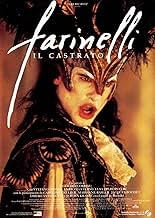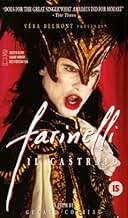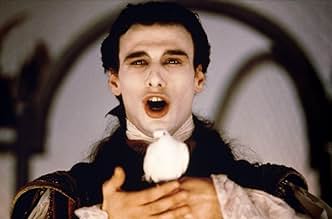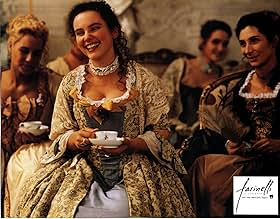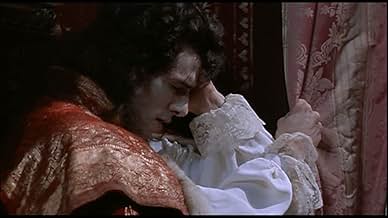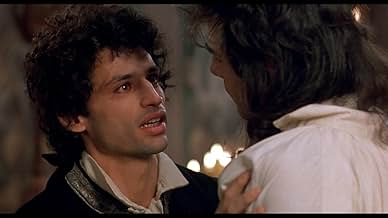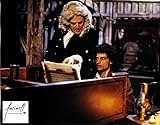AVALIAÇÃO DA IMDb
6,8/10
7,7 mil
SUA AVALIAÇÃO
A história do cantor de ópera Carlo Broschi, que cativou o público europeu do século XVIII com seu nome artístico Farinelli.A história do cantor de ópera Carlo Broschi, que cativou o público europeu do século XVIII com seu nome artístico Farinelli.A história do cantor de ópera Carlo Broschi, que cativou o público europeu do século XVIII com seu nome artístico Farinelli.
- Direção
- Roteiristas
- Artistas
- Indicado a 1 Oscar
- 6 vitórias e 4 indicações no total
Avaliações em destaque
This film was great. Even if the singing looked a little fake at times, and there was a bit too much sex than was really necessary, but a great film, with beautiful music. I thought more emphasis would have been put upon the anguish and degradation Farinelli might have felt, and more stress on the love/hate relationship the public had with the castrati, but definitely a film worth seeing.
'Farinelli' is a film well worth seeing for its memorable visual imagery and its unique soundtrack. Mid-film scenes set against the decadence of 17th-century European court life make for charming costumes and sets. Contrasting visuals of rural Italy provide their own pastoral allure that is no less charming. Moreover, the film rises admirably to the daunting technical and artistic task of reproducing the tone of a castrato voice, considering that the musical world has not seen or heard a castrato singer for more than a century.
'Ah,' you say, 'sounds gorgeous...but what's it about?' Enter Carlo and Riccardo Broschi, Italian brothers who share musical aspirations: Riccardo composes, and Carlo sings what he writes. Carlo is a gifted castrato, but Riccardo is a mediocre composer at best. In time, Carlo becomes the renowned Farinelli while Riccardo struggles with his lack of talent/recognition as well as the troublesome fact that Carlo is his meal ticket.
The simple story line masks rich potential (think 'Amadeus'), but 'Farinelli' is hampered by shallow character development and its inexplicable tendency to substitute all-too-frequent sex scenes for emotional power. Without the full realization of the characters or the ramifications of the plot, the film struggles to keep a viewer engaged, at least in my own case. The beautiful pageantry of 'Farinelli' fails to compensate for its hollow dramatic core.
In short? Not bad, but a better music movie is 'Amadeus'(among others), and a better movie with beautiful Italian visuals is 'A Room With A View' (among others).
'Ah,' you say, 'sounds gorgeous...but what's it about?' Enter Carlo and Riccardo Broschi, Italian brothers who share musical aspirations: Riccardo composes, and Carlo sings what he writes. Carlo is a gifted castrato, but Riccardo is a mediocre composer at best. In time, Carlo becomes the renowned Farinelli while Riccardo struggles with his lack of talent/recognition as well as the troublesome fact that Carlo is his meal ticket.
The simple story line masks rich potential (think 'Amadeus'), but 'Farinelli' is hampered by shallow character development and its inexplicable tendency to substitute all-too-frequent sex scenes for emotional power. Without the full realization of the characters or the ramifications of the plot, the film struggles to keep a viewer engaged, at least in my own case. The beautiful pageantry of 'Farinelli' fails to compensate for its hollow dramatic core.
In short? Not bad, but a better music movie is 'Amadeus'(among others), and a better movie with beautiful Italian visuals is 'A Room With A View' (among others).
I think some long periods of Farinelli's life are left out. The film is too focused on his love life, making it definitely a female movie. There were a lot of other aspects to explore. We also get to see the obligatory scenes of audiences being mesmerized by opera, as if they were some island natives and not opera house regulars. Nevertheless, being a high budget movie, it has great costumes and beautiful scenery. Most of all you get the chance to explore the divine music of Haendel.
This remarkable film remains one of my favourites. The story line at first left me wondering why the director had chosen to make the film in the first place. Luscious scenery, beautiful costumes, sets, extravagant, but historically accurate stagings for the opera scenes, great language and dialogue - but why make a film about an all but forgotten singer from almost three centuries ago? Nothing in the film seemed to give a clue as to why anyone would go to all the bother of reconstructing a marvelous voice so painstakingly, and choose one of the great performers of our time to oversee the performances of the music. Repeated viewings did not seem to throw any light on the vexing question that, despite all the lushness and splendour I was still missing some point to the whole exercise. It was only on the third or fourth viewing that I noticed in the opening credits a small remark - in French - "to the memory of my daughter . . "name"". Suddenly the whole thing made sense. This marvelous and true story of the castrato is, perhaps, the directors attempt to describe his impotence in the face of the loss of his beloved child. Viewed in this light the ending of the film and the sequences in London between Farinelli and Benedict finally begin to have a poignancy and a sadness that is truly stunningly and sensitively achieved whilst adding to the story line. I love this film and cannot possibly recommend it enough. Any lover of Early Music should revel in it, but it has been lifted out of the ordinary and into the universal and sublime by that one small realization. Superlatives cannot do it justice.
Visually and sound-wise this is a beautiful film that can be recommended. The flash-backs when Ricardo looks back on childhood are good, showing the tight links between the two brothers. But, one is waiting through the whole film for the continuation of the early scene where Carlo (Farinelli) does not try to prevent the soldiers from taking Ricardo away by force. There is too much focus on the brothers' conquests and maybe too little on the singing. But the songs that we hear are beautiful and when one knows the amount of work that has been put into the reconstruction of Farinelli's unique voice (covering one octave more than any singer alive today) one should probably not complain.
Você sabia?
- CuriosidadesBoth male and female voices were combined to create the sound of Farinelli's singing voice. The male voice was Derek Lee Ragin, a British countertenor and the female Ewa Malas-Godlewska, a Polish mezzo-soprano.
- Erros de gravaçãoLIGHTING. In scenes that show stage lights and chandeliers, the focus on them is softened, but it can still be seen that the "lamps" and "candles" are in fact far too steady, and too smokeless, to be or to contain live flame. Gaslight was not brought into theatres until just after 1800 (in England), and limelight -- with real quicklime -- around 1820. Also, some outdoor lighting -- outside palaces, etc. -- is obviously too bright, blue- or green-shaded, smokeless, and sharp-edged to come from a bonfire.
- Citações
Carlo Broschi: I admire your nerve, madame, in daring to defy Handel.
Countess Mauer: Women are very strong, signor Farinelli. Men's weaknesses make it necessary.
- ConexõesFeatured in The 52nd Annual Golden Globe Awards (1995)
- Trilhas sonorasOmbra fedele anch'io
[Dario's Solo: Act II, Scene XI, from Opera "Idaspe"]
Composed by Riccardo Broschi, Libretto by G.P. Candi and Domenico Lalli (1730, Venice)
Vocals performed by Ewa Malas-Godlewska (Soprano) and Derek Lee Ragin (Countertenor)
Principais escolhas
Faça login para avaliar e ver a lista de recomendações personalizadas
- How long is Farinelli?Fornecido pela Alexa
Detalhes
- Data de lançamento
- Países de origem
- Central de atendimento oficial
- Idiomas
- Também conhecido como
- 絕代艷姬
- Locações de filme
- Empresas de produção
- Consulte mais créditos da empresa na IMDbPro
Bilheteria
- Faturamento bruto nos EUA e Canadá
- US$ 1.573.411
- Faturamento bruto mundial
- US$ 1.600.226
Contribua para esta página
Sugerir uma alteração ou adicionar conteúdo ausente



